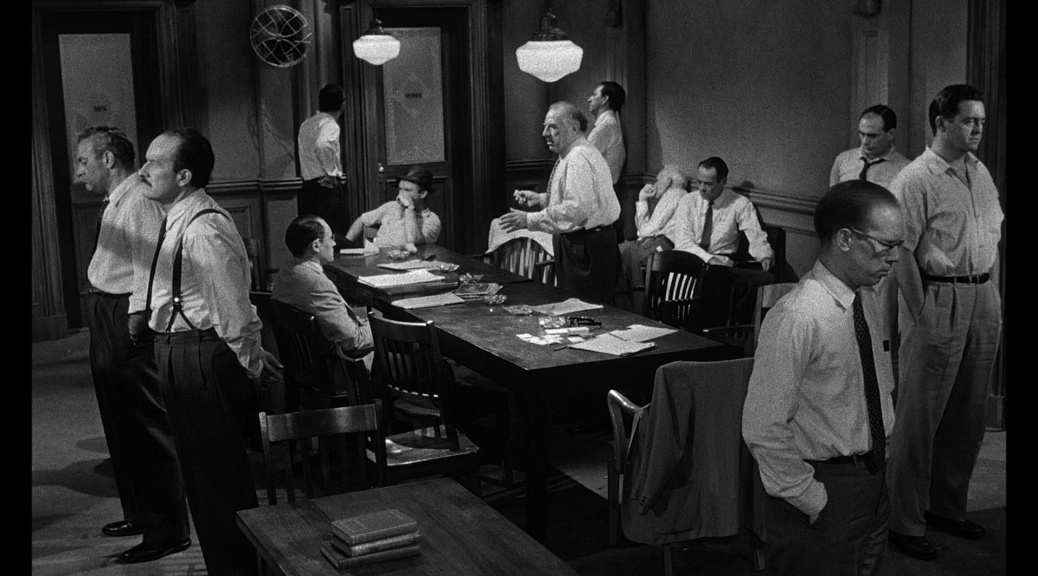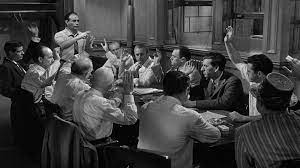🎬 12 Angry Men (1957)

Review of 12 Angry Men (1957)
Few films in the history of cinema are as timeless, riveting, and thematically rich as Sidney Lumet’s 12 Angry Men. Released in 1957 and based on Reginald Rose’s teleplay, this courtroom drama is not only a masterclass in storytelling but also a powerful exploration of human psychology, morality, and the fragile nature of justice. Set entirely in a claustrophobic jury room, the film’s minimalist approach amplifies its emotional intensity, as it examines the complexities of human bias, prejudice, and the pursuit of truth.
Plot Overview
The narrative begins with 12 jurors convening in a jury room to deliberate on a seemingly open-and-shut case. A young Hispanic boy stands accused of murdering his father, and the jury’s task is to determine his guilt or innocence. If found guilty, the boy faces the death penalty. Initially, 11 of the jurors are ready to convict without much discussion, but one man, Juror 8 (played by Henry Fonda), voices a dissenting opinion. He isn’t convinced of the boy’s guilt and insists on deliberating further to ensure that they do not send an innocent person to die.
What follows is a gripping unraveling of evidence, personal biases, and the inner workings of each juror’s mind. Juror 8’s calm persistence and logical reasoning gradually force the group to reexamine the case. The film masterfully depicts how individual prejudices, experiences, and personalities influence the decision-making process, raising important questions about the reliability of the justice system and the responsibility that comes with wielding power over another’s life.
Themes and Symbolism
At its core, 12 Angry Men is a profound commentary on justice, democracy, and the human condition. The film delves into several interwoven themes, each of which remains strikingly relevant today:
1. The Fragility of Justice
The film highlights how easily justice can be compromised by human error, indifference, or prejudice. Many of the jurors are quick to vote guilty, not because they are convinced beyond a reasonable doubt, but because they are swayed by their personal biases or simply wish to avoid prolonged discussion. The film’s tension stems from Juror 8’s determination to ensure that the boy receives a fair trial, embodying the principle that justice should not be rushed.
2. Prejudice and Bias
The film shines a harsh light on the prejudices that influence the jurors. Juror 10’s overtly racist remarks reveal his disdain for the defendant’s background, while others dismiss the boy’s defense due to stereotypes about his upbringing. Through these characters, the film critiques societal biases and challenges viewers to confront their own preconceived notions.
3. The Power of Reason and Persuasion
Juror 8’s methodical approach to the case underscores the importance of logic and reason in decision-making. He does not aim to prove the boy’s innocence outright but rather to raise doubts about the evidence presented. His ability to sway the other jurors through calm reasoning and empathy serves as a testament to the power of rational discourse in overcoming ignorance and prejudice.
4. The Dynamics of Group Behavior
The film also explores the psychological dynamics of group behavior. Initially, the majority’s decision to convict puts pressure on the lone dissenter. However, as Juror 8’s arguments gain traction, the group’s dynamics shift, revealing how collective opinions can evolve when individuals are willing to challenge the status quo.
Performance and Characterization
The cast of 12 Angry Men delivers stellar performances, each actor bringing depth and nuance to their roles. Henry Fonda’s portrayal of Juror 8 is understated yet commanding. He exudes quiet strength and moral conviction, making him the moral compass of the story.
Equally compelling are the other jurors, each of whom represents a cross-section of society. From the hot-headed Juror 3 (Lee J. Cobb) to the wise and observant Juror 9 (Joseph Sweeney), the film’s characters are richly drawn and vividly portrayed. The interactions between these men drive the narrative, with each confrontation revealing new layers of their personalities and motivations.
Juror 3, in particular, serves as a powerful antagonist. His emotional outbursts and personal vendetta against the defendant create some of the film’s most intense moments. As the story unfolds, his aggressive demeanor is revealed to stem from unresolved issues with his own son, adding a poignant layer of tragedy to his character.
Direction and Cinematography
Sidney Lumet’s direction is nothing short of masterful. Despite the confined setting, he creates a sense of visual variety and tension through innovative camera work and staging. As the film progresses, the camera gradually moves closer to the characters, using tighter shots to emphasize the growing intensity of their deliberations. The oppressive heat and lack of ventilation in the jury room further heighten the tension, mirroring the rising tempers and emotional stakes.
Lumet’s decision to shoot the film almost entirely in real time enhances its sense of immediacy. The viewer feels as though they are part of the deliberation process, experiencing every twist and revelation alongside the jurors.
Script and Dialogue
Reginald Rose’s script is a triumph of economy and precision. The dialogue crackles with authenticity, capturing the distinct voices and perspectives of each juror. Every line serves a purpose, whether it’s advancing the plot, revealing character, or exploring the film’s larger themes. The script’s sharp focus on dialogue allows the story to unfold organically, building suspense and tension through the interplay of ideas rather than action.
One of the most memorable aspects of the script is its ability to convey complex moral and social issues without becoming preachy or didactic. The film’s power lies in its subtlety, inviting viewers to draw their own conclusions about the characters and their choices.
Relevance Today
More than six decades after its release, 12 Angry Men remains as relevant as ever. Its exploration of systemic biases, the fallibility of human judgment, and the moral responsibility of jurors resonates in an era where issues of justice and equality continue to dominate public discourse. The film’s message about the importance of standing up for one’s principles, even in the face of overwhelming opposition, is a timeless reminder of the value of integrity and courage.
Moreover, the film’s depiction of the deliberative process serves as a compelling argument for the power of empathy and open-mindedness. By challenging each other’s assumptions and engaging in honest dialogue, the jurors ultimately reach a more just outcome, demonstrating the potential for individuals to overcome their differences and work together in pursuit of a common goal.
Conclusion
12 Angry Men is a cinematic masterpiece that transcends its genre to become a profound meditation on justice, morality, and the human spirit. Its tightly woven narrative, exceptional performances, and incisive social commentary make it a film that rewards repeated viewings. Sidney Lumet’s masterful direction and Reginald Rose’s razor-sharp script ensure that the film remains both a gripping courtroom drama and a timeless cultural touchstone.
Whether you’re a fan of classic cinema, a student of human psychology, or simply someone who appreciates compelling storytelling, 12 Angry Men is a film that demands to be seen and discussed. It is not merely a movie but an enduring work of art that continues to inspire, challenge, and provoke audiences around the world.